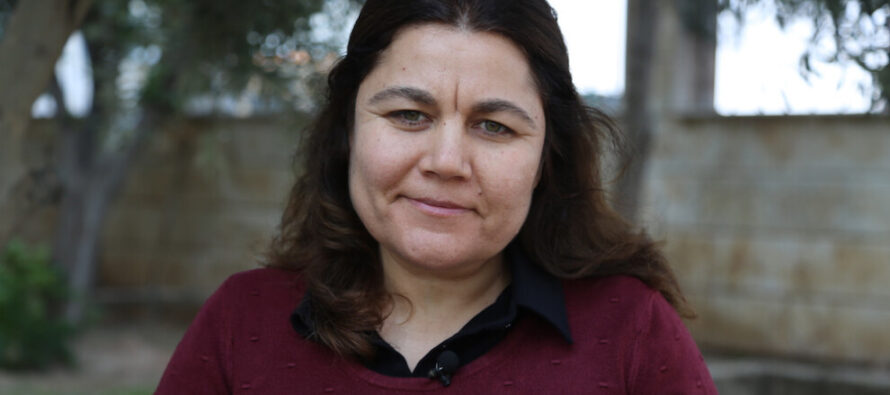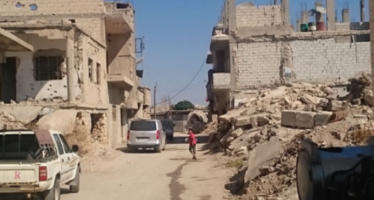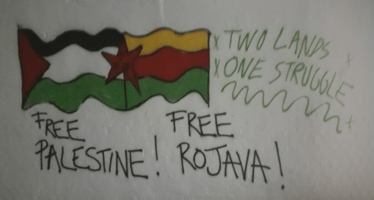Foza Yûsif: ENKS imposes unacceptable demands

![]()
PYD Co-Presidency Council member Foza Yûsif said that there is a deadlock in the talks on unity in Rojava, and added that the ENKS “violated the red lines” and “imposed unacceptable demands” by standing with the murderers of the Kurds.
Democratic Union Party (PYD) Co-Presidency Council member Foza Yûsif, said that ongoing unity talks between the Kurdish National Union Parties (PYNK) and ENKS in Rojava are deadlocked. She spoke about this, the Turkish state’s attacks on North-East Syria, the constitutional talks in Geneva, the new US administration’s Syria politics, Russia’s role in the political solution and the latest situation in Shengal to ANF.
Foza Yûsif said that the deadlock is caused by the ENKS “violating the red lines posed by the Rojava people” and “imposed unacceptable demands”.
Emphasizing that the Turkish state and its mercenary groups are the biggest obstacle in front of the political solution in Syria, Foza Yûsif added that “a new opposition front should be established” and that “the format of Geneva should be changed and the constitutional committee should be re-established”.
Foza Yûsif said that they expect the new administration of the USA to have a serious program for a political solution as well as the struggle against ISIS, and said that Russia can contribute significantly to the solution of the Syrian crisis if it wishes.
Yûsif, who also evaluated the agreement signed by the KDP with the Iraqi central government on Shengal and the tension in the region, said: “No one should see himself as a single speaker or a voice on behalf of the Kurds.”
Talks on national unity have been going on for almost a year in Rojava. There are some reports that the talks have stopped. What is the latest situation in the talks between PYNK and ENKS?
In Rojava, we consider the negotiations between the Kurdish parties as strategic for the solution of both the internal problems of the Kurds and the Syrian crisis. In the negotiations that have been going on for about a year, good steps were taken at first and important progress was made. It is important for the Kurds to meet on a common ground for a solution. But recently, there has been a deadlock in these talks and the talks have stopped.
What is the reason or causes of this deadlock?
The change in the US and coalition’s team that mediated the negotiations and the new team’s still not taking office also had an effect on this deadlock. However, the main reason for this is the approach of ENKS, which sees Rojava as a company and wants this company to be shared. The process the Kurds are going through and the purpose of these talks on unity are not to share Rojava. Our aim is to democratically associate all political parties and forces in the region according to the level of their representation and social counterpart. But the ENKS is rather thinking of a model like the Bashure Kurdistan one and it is after sharing. We also express that the realism, people and components of Rojava are not like Bashure Kurdistan and that the Bashur model cannot be applied here. Because every place has its own unique features. A model to be developed should be based on Rojava’s specificity. When you don’t take this into consideration, deadlocks emerge.
While this is a cause of deadlock, the other was the ENKS visit to Turkey. Because the Turkish state denies the existence of Kurds and the Kurdish cause. The last visit of the ENKS was a visit that further increased the conflicts between Kurdish forces. This visit caused a great reaction among the Kurdish people. In a period when attacks against our people continue uninterruptedly, daily brutal attacks continue in Afrin, Girê Spî and Serêkaniyê, and the demography of the region is changed, this visit, whose purpose and reason is unknown, negatively affects the talks.
On the other hand, the ENKS representatives standing with the murderer of Hevrîn Xelef and their images with mercenaries attacking the values of our people every day weaken the steps taken for unity. These irresponsible approaches, which do not take into account the sensitivities of our people, make it difficult to take steps and stir doubts. Because there are some red lines that our people will not allow to be crossed, and everyone should be responsible for these red lines.
These are the reasons for this deadlock. Add to this that the ENKS comes up with a new unacceptable condition every day. No political power alone can meet the demands. The unfulfilled demands that the public will not accept, make the progress of this process difficult.
On the other hand, as you have pointed out, the attacks of the invading Turkish state and the mercenaries in the region have recently increased…
Yes, there is a serious increase in the attacks of the Turkish state and the mercenaries, especially in the regions of Ayn Issa, Til Temir and Shehba. Likewise, there is a serious increase in war crimes being carried out in Afrin, Serêkaniyê and Girê Spî. There was also a report prepared by the United Nations on this subject. However, since the requirements of the report, that is, the sanctions, are not implemented, this also encourages the Turkish state and the mercenaries to continue along these lines. However, the actions in the occupied areas are not like those carried out by ISIS. These mercenary groups, which are the leftovers of ISIS, must withdraw from the regions they occupy. The international community should have taken steps in this regard. However, condoning the crimes of the Turkish state and the mercenaries makes these crimes even more savage.
The attacks of the Turkish state against the region once again show who is the main aggressive force in the region. The Turkish state has constantly lied to the international community saying that there have been attacks against it from the border. How unfounded these claims are can be seen once again with the attacks they made against the regions of Ayn Issa, Til Temir, Shehba and the M4 road. In these regions, they constantly target civilians. They target innocent women, children and civilians in their villages. Because the Turkish state wants to invade these regions by moving these people from here.
Unfortunately, both the USA and Russia did not implement the requirements of the ceasefire agreements they signed up to now at the desired level. This situation gives ground and courage to the attacks of the Turkish state and the mercenaries.
You said that most of the mercenary groups acting together with the Turkish state should be treated as “ISIS”. But both the United States and Russia are meeting and dealing with these groups, and now there are constitutional talks with their representatives in Geneva.
Yes, true. Unfortunately, we are faced with the great hypocrisy of the international community, especially the international community that talks about a political solution for Syria, about stability, and about human rights. Let me give you an example: the representatives of these mercenary groups, which have no purpose other than pillage, destruction, massacre and theft, are currently on the constitutional committee. But the representation of 5 million people in North-East Syria is neither in the constitutional committee nor in Geneva. This example alone shows that the international community or the United Nations are still not serious in solving the Syrian problem.
Moreover, these negotiations are trying to legitimize these mercenary groups that commit war crimes in Syria. But as long as these terrorist groups are at the solution table, it is not possible for a solution to develop in Syria. Let aside the development of the solution, the problems will get even deeper. A constitution in which these mercenaries are represented and the will of North-East Syria is not reflected will not bring a solution to Syria. Because these structures we have mentioned are structures that lost their legitimacy with the invasions of Afrin, Girê Spî and Serêkaniyê. These structures are enemies of the Syrian people. If a solution is really sought, these structures must be abolished and a new opposition front must be created.
Is there a ground for a new opposition front?
The situation of Syria makes such a change compulsory. If a solution is really sought, the format of Geneva must change and the constitutional committee must be rebuilt. In this context, the Syrian opposition should also be reviewed. Because this opposition is an opposition that creates and deepens problems instead of developing solutions. An opposition built on hatred of Kurds, radicalism and mercenarism cannot be expected to contribute to a solution.
At this point, we would like to ask about the relations with the Damascus regime. Is there any dialogue in place with the Damascus regime?
Damascus insists that the regime knows already and still acts with the same mentality. We have tried many times before to overcome this. But unfortunately we did not get any result. The regime insists on deadlock. This causes the problems to deepen. If this continues in this way, the economic and political crisis in Syria will deepen. Again, the main thing that led to the invasion in Syria was this insistence of the regime on deadlock. This insistence of the regime, that is, its insistence on deadlock, is becoming more and more scorching and destructive for the whole of Syria.
We had elections in the US and Joe Biden won the challenge. Could there be a change in the US policy towards Syria with the Democrats coming into power? If there is going to be a change, which type of change could it be in your opinion?
Democrats were in power when the Syrian crisis started. During the Obama administration, our partnership against ISIS developed and significant successes were achieved militarily. Unfortunately, the same success was not achieved politically. Again, the same steps were not taken regarding the solution. In this regard, the main expectation is that the new administration takes a determined stance on a political solution for the whole of Syria. Because the anti-ISIS coalition had important achievements and successes. If these gains and successes are not crowned with a political solution, gains and successes will be incomplete. Therefore, the new administration of the United States has an important role to contribute strongly to the development of the political solution.
Didn’t the ambivalent or, to be more accurate, an approach which allows changing allies from time to time, by the US since the beginning of the Syrian war delayed the political solution? For example, when the war broke out, the United States carried out a policy that was first built on radical groups. And I refer in particular to the role given to the Turkish state which allowed to growth of structures such as ISIS and Al Nusra. Afterwards, the US developed relations with the Kurds and North-East Syria, but the agreements with the Turkish regime, made by Trump and James Jeffrey, have greatly damaged the Kurds and North-East Syria and have revived ISIS.
Yes, true. This is an important point. The new US administration team made some statements about Syria, Kurds and the politics followed during the election process. These were important. It may be difficult to say what will happen now, but there will be some changes in US policy. There is no doubt that the US has a strategy that prioritizes its interests. The stability of the region is also part of this strategy. That’s why I think they will take an active role in Syrian politics. We think that the resolute struggle we waged against ISIS should be shown also for a political solution.
What about the role of Russia, one of the main powers in the region? Russia’s approach towards the region and the peoples of the region has so far advanced on a tactical basis. What role falls on Russia for a political solution in the new era?
Russia is a power that has a say in Syria and has a great influence. It has already shown that it has the power to do many things if it wants to. For example, we saw this in the negotiations between the Autonomous Administration and the Damascus government. Unfortunately, we did not see the same determination from Russia to stand by these talks till the end.
Russia should pursue a policy that respects all peoples and beliefs in Syria. This is an important point in Russia’s interests. Russia can secure its interests in Syria in this way. In connection with this, Russia should play a constructive role in the solution of the Kurdish problem. But Russia has not played that important role so far. It was not because it was unable to do this, it did not play this role even though it had the power to do so. Russia saw its interests represented more by the Turkish state and played with it. We expect Russia to play a constructive role for a political solution. Because we are entering 2021 and 10 years of Syrian war. We want to state that we will contribute to the steps Russia will take for a political solution.
To finish up, let’s talk about the latest developments in Shengal. As it is known, the KDP and the Iraqi central government signed an agreement on 9 October that ignored the will of the people of Shengal. After this agreement, the KDP and the Iraqi government started to deployed military forces in Shengal simultaneously. This issue also caused serious tension among the Kurdish forces. What do you think should be the approach to Shengal?
When we look at the picture in general, we see that many powers have developed a Kurdish policy of their own, more precisely they are trying to create their own “Kurd”. It is known that the basis of many of these approaches is the intention to leave Kurds without status again in the 21st century. Kurds fought a great struggle against ISIS in all parts. It was because of the fact that the Kurds were the only voice against ISIS that made this voice so loud. This once again showed that when Kurds are united, they can make a tremendous impact. However, they lose when they are divided. That is why all Kurdish parties have a great responsibility. A small mistake can cause big losses. And it will be a loss for all of us.
As for the Shengal issue, we can state the following: What happened in Shengal in 2014 is a black stain for all Kurds, especially the Bashur forces and their parties. Shengal was not protected and underwent a brutality unheard of. Now the will of the people of Shengal is being ignored. Instead of removing that black stain, there is an approach to Shengal and Yazidis which is absolutely calculated. This agreement is neither in the interest of Shengal nor in the interest of Bashur. If the will of Shengal is not respected today, tomorrow the will of Kirkuk, Xaneqîn, Celawla and other places under article 140 will not be respected. The Shengal deal will set a bad precedent for these places. If you do not respect the autonomy of Shengal today, the Bashure Kurdistan parliament will not be respected tomorrow and the acquired rights can be up for discussion. These are all interdependent things. That is why, when making diplomacy and making agreements, one should not have narrow approaches. These are dangerous approaches.
Nobody should see himself as the single word or the voice on behalf of the Kurds. Because the Kurdish problem is a regional and international problem that is interconnected with all its parts. Strengthening a part or region means strengthening other parts and regions. On the contrary, the weakening of a place means the weakening of other parts and regions. For example, besieging Shengal means besieging Rojava. If Rojava had not been strong before, could it have supported Shengal at the time of the genocide? That’s why we are all connected to each other, and the step taken in one place is not limited to that place alone.
We now consider ourselves responsible to Shengal. Likewise, the protection and support of Shengal and the Yazidis is the duty of all Kurds. From now on, we will continue to stand by Shengal diplomatically and politically. Because it is a national duty to take care of Shengal and this duty is the duty of all Kurds.
Related Articles
The Struggle for Kobanê – A Future for Kurds?
![]()
This week in September marks the 6th (since September 2014) anniversary of the Islamic State/Daesh’s advance on and siege of the Kurdish city of Kobanê
Feminists in Ireland release letter in solidarity with “our friends in Rojava”
![]()
The following letter has been signed by feminists living in Ireland, including WSM members
10 thousand people in Rome for Rojava
![]()
Thousands of people poured into the streets in Italian capital city Rome to mark 1 November World Kobanê Day and




